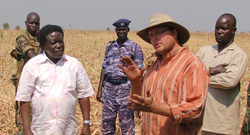
Blomberg | 24 March 2011
By Matt Richmond
March 24 (Bloomberg) -- Foreign investors are buying large tracts of land in Southern Sudan that add up to an area larger than Rwanda, threatening food supplies and stability in a region due to become independent in July, a Norwegian aid group said.
International organizations have sought or acquired 26,400 square kilometres (10,000 square miles) of land for agricultural, biofuel and forestry projects since 2007, Oslo- based Norwegian People’s Aid said yesterday in a report. When domestic investments, previously established mechanized farms and investments in tourism are included, the total comes to 57,400 square kilometres, about 9 percent of the region’s total land area, it said.
The group examined 28 land deals under negotiation or completed, mostly between state governments and foreign companies, and found that laws governing land ownership and investment were routinely violated. The report does not include deals signed or sought by oil or mining companies.
“While in theory this influx of investment could provide development opportunities for rural communities, without the proper procedures in place there is a danger that it will serve to undermine livelihoods,” the report said.
Southern Sudan, which fought a two-decade war against the north, will emerge as one of the world’s least developed nations, according to the United Nations. The semi-autonomous government based in Juba relies on oil revenues for 98 percent of its budget and has been seeking foreign investment.
Food production
There are no guarantees that the food produced at large- scale farms will be sold in local markets, the report said.
“A number of the investments are located in highly populated areas where tens or even hundreds of thousands of people rely on land and natural resources for their daily livelihoods,” according to the report. “If the project proponents choose to deny local populations access, it could have devastating impacts on rural communities whose lives have already been sorely affected by poverty, food insecurity, and conflict.”
At independence, Southern Sudan will assume control of about three-quarters of Sudan’s current oil production of 490,000 barrels a day, pumped mainly by China National Petroleum Corp., Malaysia’s Petroliam Nasional Bhd. and India’s Oil & Natural Gas Corp.
Foreign investment in land is increasing across sub-Saharan Africa, according to the UN Food and Agriculture Organization. It said in a 2010 report that about 200,000 square kilometres of agricultural land in Africa were acquired by foreign interests between 2007 and 2010.
Ownership Disputes
The largest investment in Southern Sudan, by United Arab Emirates-based Al Ain Wildlife, covers almost 22,800 square kilometres in Jonglei and Eastern Equatoria states. The company has acquired all of Boma National Park, the report said.
While a 2009 law that governs land ownership says companies and the government must consult with local communities before an agreement can be signed, the report found that occurred in only two of the 28 deals.
The perception of local residents that the sales were done without their approval may lead to the voiding of leases and conflict with communities, according to the report.
Southern Sudan’s investment minister, Oyay Deng Ajak, said in a phone interview in Juba that he couldn’t comment on the report because he had not seen it.
--Editors: Karl Maier, Paul Richardson.
To contact the reporter on this story: Matt Richmond in Juba via Johannesburg at [email protected].
To contact the editor responsible for this story: Antony Sguazzin at [email protected].













